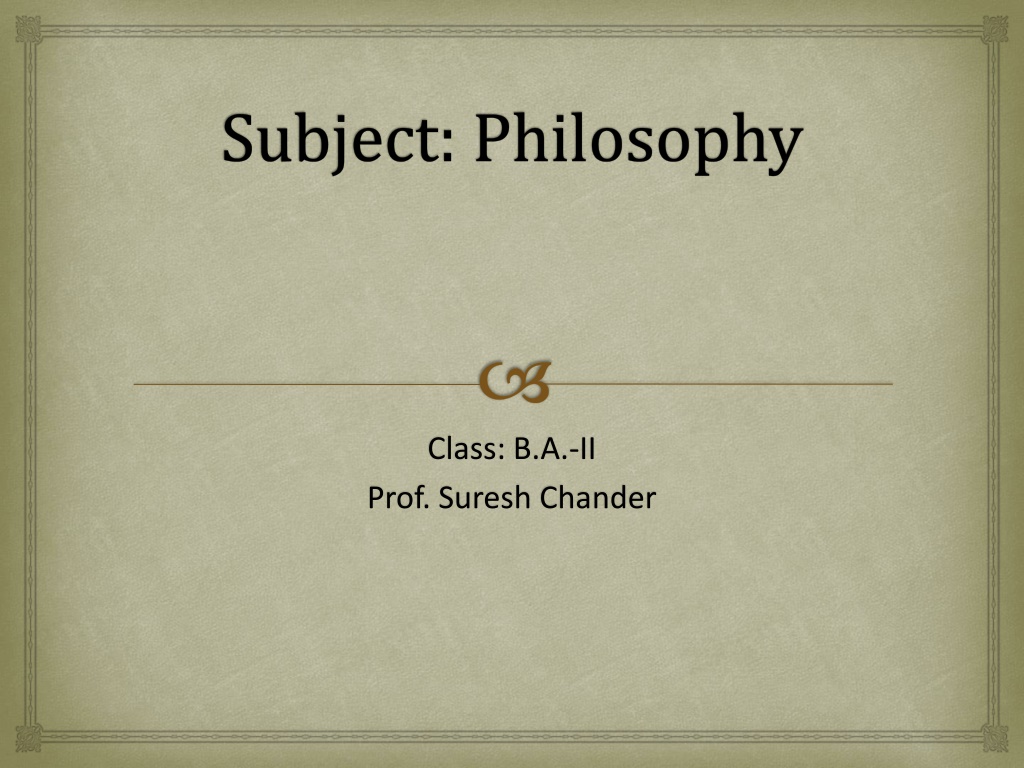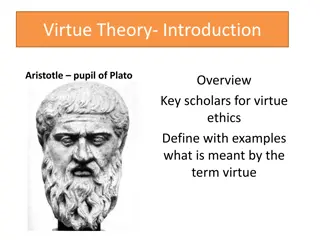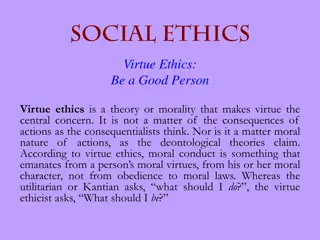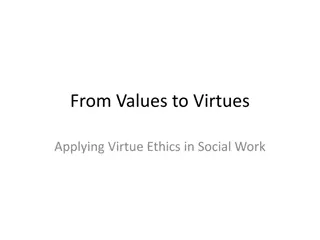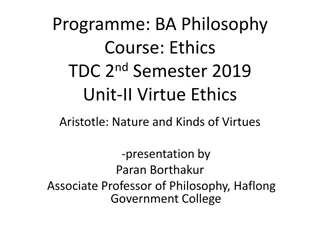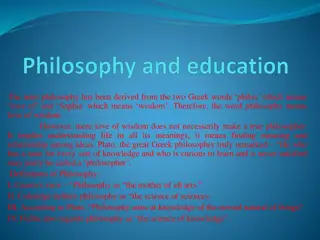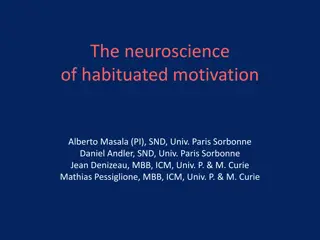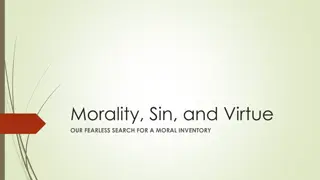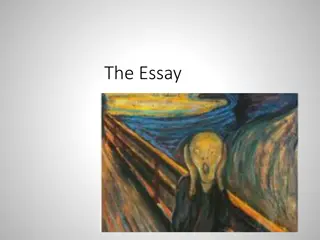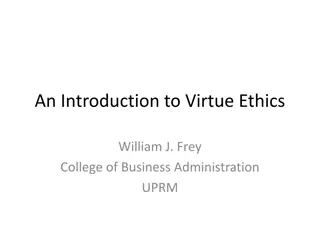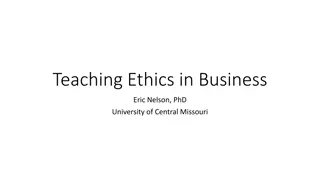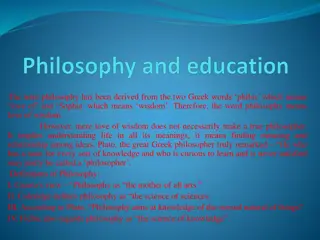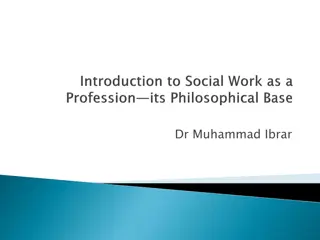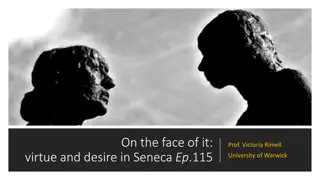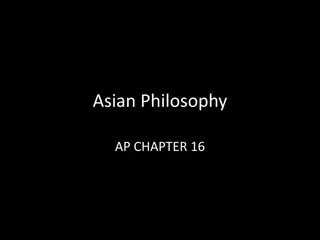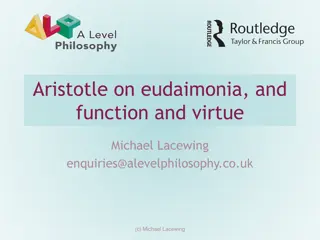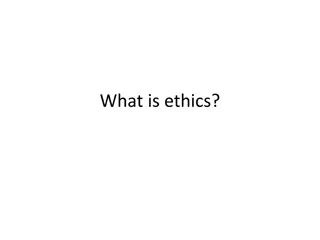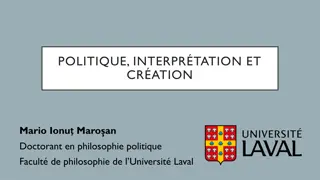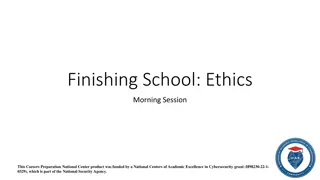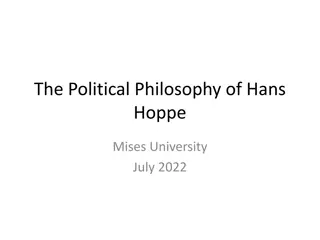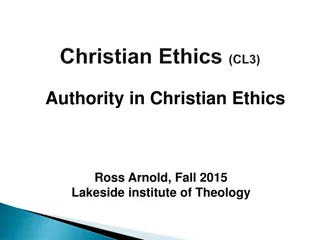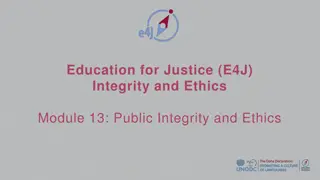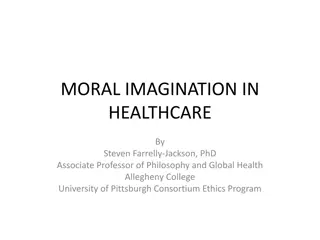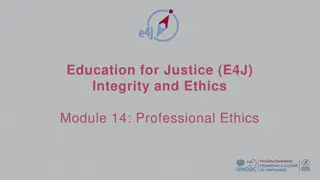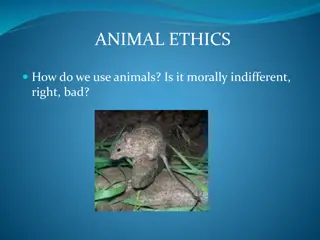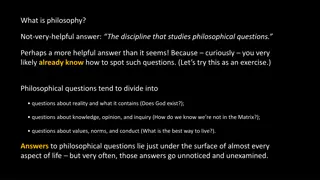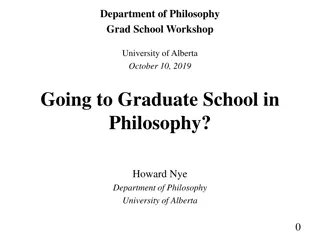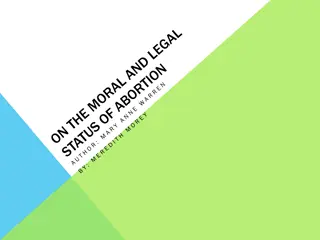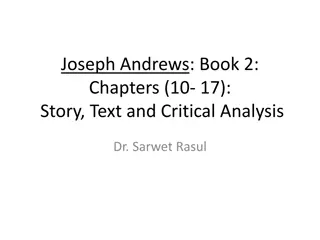Exploring the Interplay of Ethics, Virtue, and Humanity in Philosophy
Delve into the origin and essence of ethics, the cultivation of virtues, and the intrinsic connection between ethics, aesthetics, psychology, religion, and philosophy. Discover the profound influence of character traits, moral principles, and the pursuit of goodness on human conduct and societal values.
Download Presentation

Please find below an Image/Link to download the presentation.
The content on the website is provided AS IS for your information and personal use only. It may not be sold, licensed, or shared on other websites without obtaining consent from the author. Download presentation by click this link. If you encounter any issues during the download, it is possible that the publisher has removed the file from their server.
E N D
Presentation Transcript
Subject: Philosophy Class: B.A.-II Prof. Suresh Chander
Nature of Ethics The English word "ethics" is derived from the Ancient Greek word thik s, meaning "relating to one's character", which itself comes from the root word thos meaning "character, moral nature". This word was transferred into Latin as ethica and then into French as thique, from which it was transferred into English. Definition: Normative Ethics is a Normative which concerned with establishing how things should or ought to be, how to value them, which things are good or bad, and which actions are right or wrong. It attempts to develop a set of rules governing human conduct, or a set of norms for action.
Virtue & Goodness Eventually, we develop habits that become fixed character traits of our personality. In short, we acquire what moral philosophers call virtues positive character traits that regulate emotions and urges. Typical virtues include courage, temperance, justice, prudence, fortitude, liberality, and truthfulness. In philosophy, something is good if it is important or valuable. Objects (things), people, ideas, and actions can be good.
Ethics and Aesthetics Ethics is the branch of philosophy that studies how man ought to act given the nature of reality (metaphysics) and how man knows it (epistemology). Aesthetics is the selective re-creation of reality according to an artists judgment. In art, the artist's view of metaphysics, epistemology and ethics will be concretizes.
Psychology and Religion Religion is the relationship between groups to proscribed and emergent spiritual beliefs. Psychology is based in the logic of frames of mind s impacts on behaviour, Philosophy is the relationship between contemplative insight and knowledge, in application toward refining and evolving thought and action, and science is the control and wielding of method yielding the wielding and control of Nature and awareness they are all related by one thread, internalization and inquiry, they are related by a desire to know the nature of the universe and personal experience and translate this to advantage and purposeful action.
Cont. Religion is a belief system based on spirit and soul, hope and fate. Psychology (of religion) is human intellect studying the causes and practices of religion on a non-spiritual and scientific basis. Philosophy is figment and discernment of things observed in nature and the macrocosm based on spiritual and non-spiritual values, with deep reliance on scientific erudition. Science does not deal with the spirit, the soul, hope or fate, nor does it dabble in figment or discernment, but what it does do well is analyse how things work and how to get things done. As far as relationships between the four is concerned, religion might want a place of worship, philosophy might imagine a cathedral, the sciences might plan and build the cathedral, and psychology might study how and why it all happened.
The notion of Truth Truth, in metaphysics and the philosophy of language, the property of sentences, assertions, beliefs, thoughts, or propositions that are said, in ordinary discourse, to agree with the facts or to state what is the case. Truth is the aim of belief; falsity is a fault. People need the truth about the world in order to thrive.
Beauty & Goodness Aesthetics is a branch of philosophy that deals with the nature of art, beauty and taste and with the creation or appreciation of beauty: a particular theory or conception of beauty or art. In ethics, the good is that which conforms to the moral ideal. It is a fundamental normative concept. Specific definitions of philosophers: The Good according to Plato: Good is not an essence, but something to pass away gasoline in majesty and power (The Republic) The Good according to Aristotle: The good is that toward which it tends in all circumstances (Nicomachean Ethics) The Good according to Spinoza: By good, I mean, any kind of joy, all that fills the wait The Good according to Locke: Good is everything in us pleasure (Essay Concerning Human Understanding The Good according to Descartes: The highest good of all men is a whole heap of all property, both the soul and the body of capital, which may be in some men but that of each individual is in anything else and it consists only of a determination to do well, and contentment q elleproduct (Passions of the Soul) The Good according to Kant: The virtue and happiness are the highest good (Critique of Practical Reason)
Reflective Morality Reflective morality can be explained by the word 'reflection'. Thoughts are reflected when we think, so it is a morality that is derived out of thinking. That means applying reason on morality, more so for the inherited morality. For example, a father who is a drunkard, irresponsible and lazy, distorts the peace of a family. Do you still apply conventional morality which says pay respect and keep your voice low when speaking to your elders? This is where reflection is required, reason has to be deployed and life has to be examined. I think this is moral decision making based on internalized processing, including thinking.
Action, Intention Theory of action is an area in philosophy concerned with theories about the processes causing wilful human bodily movements of a more or less complex kind. This area of thought involves epistemology, ethics, metaphysics, jurisprudence, and philosophy of mind, and has attracted the strong interest of philosophers ever since Aristotle's Nicomachean Ethics. Intention is a mental state that represents a commitment to carrying out an action or actions in the future. Intention involves mental activities such as planning and forethought.
Situation and Character Situational ethics or situation ethics takes into account the particular context of an act when evaluating it ethically, rather than judging it according to absolute moral standards. With the intent to have a fair basis for judgments or action, one looks to personal ideals of what is appropriate to guide them, rather than an unchanging universal code of conduct, such as Biblical law under divine command theory or the Kantian categorical imperative. Moral character or character is an evaluation of an individual's stable moral qualities. The concept of character can imply a variety of attributes including the existence or lack of virtues such as empathy, courage, fortitude, honesty, and loyalty, or of good behaviours or habits. Aristotle has said, "We must take as a sign of states of character the pleasure or pain that ensues on acts."
Virtue Ethics : Aristotle Aristotle emphasized that virtue is practical, and that the purpose of ethics is to become good, not merely to know. Aristotle also claims that the right course of action depends upon the details of a particular situation, rather than being generated merely by applying a law. The type of wisdom which is required for this is called "prudence" or "practical wisdom" as opposed to the wisdom of a theoretical philosopher. But despite the importance of practical decision making, in the final analysis the original Aristotelian and Socratic answer to the question of how best to live, at least for the best types of human, was to live the life of philosophy.
Four Cardinal Virtues Prudence, also known as practical wisdom, is the most important virtue for Aristotle. In war, soldiers must fight with prudence by making judgments through practical wisdom. This virtue is a must to obtain because courage requires judgments to be made. Temperance, or self-control, simply means moderation. Soldiers must display moderation with their enjoyment while at war in the midst of violent activities. Temperance concerning courage gives one moderation in private which leads to moderation in public. Courageis moderation or observance of the mean with respect to feelings of fear and confidence. Courage is observance of the mean with regard to things that excite confidence or fear, under the circumstances which we have specified, and chooses its course and sticks to its post because it is noble to do so, or because it is disgraceful not to do so. Concerning warfare, Aristotle believes soldiers are morally significant and are military and political heroes. War is simply a stage for soldiers to display courage, and is the only way courage can be exemplified. Any other action by a human is simply the copying a soldier's ways; they are not actually courageous. Justice means giving the enemy what is due to them in the proper ways; being just toward them. In other words, one must recognize what is good for the community and one must undertake a good course of action.
Categorical imperative The Categorical Imperativeis the central concept in Kant s ethics. It refers to the supreme principle of morality , from which all our moral duties are derived. The basic principle of morality is an imperative because it commands certain courses of action. It is a categorical imperative because it commands unconditionally, quite independently of the particular ends and desires of the moral agent. Formulations: Kant provided several formulations of the categorical imperative and claimed that they were all equivalent. In addition to the Universal Law of Nature formula discussed above, it is widely agreed that Kant elaborates three others: (2) The Humanity Formula (3) The Autonomy formula and (4) the Kingdom of Ends formula. In its best known formulation the humanity formula is: Act in such a way that you always treat humanity, whether in your own person or in the person of any other, never simply as a means, but always at the same time as an end The third formulation of the categorical imperative is the Idea of the will of every rational being as a will that legislates universal law The fourth, Kingdom of Ends formulation of the categorical imperative, states that we must act in accordance with the maxims of a member giving universal laws for a merely possible kingdom of ends
Hedonism Hedonism is the philosophy that pleasure is the most important pursuit of mankind, and the only thing that is good for an individual. Hedonists, therefore, strive to maximize their total pleasure (the net of any pleasure less any pain or suffering).
Characteristics The main characteristics of hedonism are the following: The main characteristic of hedonism is the constant search for pleasure and the avoidance of pain at all costs. Its ethical representative was Epicurean, who affirmed that having a life full of pleasure was the only way to achieve maximum happiness. The only pleasure that exists is the one that does not cause any kind of pain. It has different types of pleasures that do not only include sexual gratification. For hedonists, spiritual pleasure was more important than sensible pleasure. They can always find time to enjoy and relax no matter what the rest of the world has to do. Avoid pain or damage either directly or collaterally. They are not limited to material pleasures nor does money mean any kind of obstacle to them.
Criticism of Hedonism: But this view is wrong. Health, wealth, knowledge, beauty, virtue, etc., are values; and when we achieve them, we feel pleasure, and if we fail to do so, we feel pain. Value resides in an object of desire. Pleasure is the sense of positive value; and pain is the sense of negative value.
Utilitarianism Utilitarianism is a moral theory that advocates actions that promote overall happiness or pleasure and rejects actions that cause unhappiness or harm. A utilitarian philosophy, when directed to making social, economic, or political decisions, aims for the betterment of society. Utilitarianism is a normative ethical theory that places the locus of right and wrong solely on the outcomes (consequences) of choosing one action/policy over other actions/policies. As such, it moves beyond the scope of one's own interests and takes into account the interests of others. Mill defines utilitarianism as a theory based on the principle that "actions are right in proportion as they tend to promote happiness, wrong as they tend to produce the reverse of happiness." Mill defines happiness as pleasure and the absence of pain.
Criticism of Utilitarianism (1) The moral and psychological basis of utilitarianism is not real: Utilitarianism is based on the notion that whatever functions should or should not be performed by the individual should be tested on the touch-stone of utility. If this notion is accepted, each individual will work only for his own pleasure. (2) Against human nature: The utilitarian s are of the view that the individual does every work for the attainment of pleasure and for the avoidance of pain. But this analysis of human nature is one-sided. The fact is that human nature is complex. He has qualities like pity, faith, service, benevolence, love, sympathy, sacrifice and forgiveness in him. (3) The utilitarian s laid emphasis upon the material comforts only and ignored the spiritual happiness: The utilitarian s have cared only for physical comfort, and have ignored the suppression of sense and self-control. They have also no cared for the spiritual comfort which one derives from self-sacrifice for the sake of humanity. (4) It is improper to lay emphasis solely upon the quantity of pleasures: Bentham has stressed only upon the quantity of pleasure. He has not taken up the qualitative difference; therefore, John Stuart Mill has taken up the qualitative difference, which is appropriate.
Cont. (5) Bentham did not establish any reconciliation between the interests of the individual and those the society: Maxy has written, Nor was Bentham able to cross the chasm between individual and social utility . He did not agree that it was difficult to make any difference between the individual interests and social interests. (6) The doctrine of maximum welfare of the maximum number is not free from complications: Sometimes it is possible that the majority may become selfish and in the name of maximum welfare of maximum number; it may suppress the minority. For instance, the Muslims of Pakistan have turned out the Hindus from their country. This is altogether unfair. Therefore, many atrocities can be committed in the name of this doctrine. Conclusion: The theory of utilitarianism has been bitterly criticised and many difficulties will crop up, if it is given a practical shape. However, the main advantage of this theory was that many speculative theories regarding the state received a severe set-back. The utility became the criterion for the test of the values of state and institutions.
Foetal Rights Foetal rights are the moral or legal rights of the human foetus under natural and civil law. The term foetal rights came into wide usage after the landmark case Roe v. Wade that legalized abortion in the United States in 1973. The concept of foetal rights has evolved to include the issues of maternal drug and alcohol abuse. While international human rights instruments lack a universal inclusion of the foetus as a person for the purposes of human rights, the foetus is granted various rights in the constitutions and civil codes of several countries. Many legal experts believe there is an increasing need to settle the legal status of the foetus.
Female Foeticide Women, who constitute half the human population, are encountered with many challenges. Female foeticide is perhaps one of the worst forms of violence against women where a woman is denied her most basic and fundamental right i.e. The Right to Life. As there is no particular definition of female foeticide provided by the Criminal Law but the following definition of my own will clear your conception: Female foeticide is the killing of a healthy female foetus, in order to get rid of a female child by means of Medical Termination of Pregnancy (MTP) or Abortion . Female foeticide is considered a criminal offence in India. Abortion is lawful only when the doctor believes that due to medical reasons the continuance of the pregnancy may pose a threat to the health of the mother or the unborn child.176 Pre-Conception and Pre-Natal Diagnostic Techniques (Prohibition of Sex selection) Act, 2002 The Act provides for the prohibition of sex selection, before or after conception. It regulates the use of pre-natal diagnostic techniques, like ultrasound and amniocentesis by allowing them their use only to detect: No laboratory or centre or clinic will conduct any test including ultrasonography for the purpose of determining the sex of the foetus. No person, including the one who is conducting the procedure as per the law, will communicate the sex of the foetus to the pregnant woman or her relatives by words, signs or any other method.
Cont. The Indian Constitution has recognized the right to life under Article 21 as also recognized in several cases. But this is hardly available to the unwanted girl child. Hence the right of the girl child may be construed in broader terms and should be read as: Right to be born and not to be aborted only because she is a girl. Right to remain alive after birth and not to be killed at any moment after birth. Right of the girl child to her mind her body, right to childhood and right to a healthy family environment. RIGHT TO LIFE OF FETUS: Regard for sanctity of the embryo from the moment of conception is enjoined by the Hindu Scriptures. Thus, the destruction of a foetus is condemned as a heinous offence equal to Brahmahatya. In this condemnation, no distinction appears to have been made between different stages of gestation. The Garbhoponishad, which gives a meticulous account of the development of the foetus from the moment of conception of the mother, it states that from the second day after the entry of the male semen into the female uterus, the semen gets thickened and from the 8th day it takes the shape of a ball which is transformed into a lump after 15 days, leading to the creation of the head and the legs after two months. It follows that it would be an offence if the embryo is destroyed even at the nascent stage186
Cont. Medical Termination of Pregnancy (MTP) Act a pregnancy can be terminated under these circumstances. If the pregnancy can cause physical or mental injury to the mother. In case the foetus has a handicap. In case the pregnancy is the result of a rape. In case of the failure of contraception. Termination of pregnancy the last decision of mother or the parents.
Sexual Harassment Unwelcome sexual advances, requests for sexual favours, and other verbal or physical Conduct of a sexual nature when: Submission to such conduct is made either explicitly or implicitly a term or Condition of an individual's employment, or Submission to or rejection of such conduct by an individual is used as a basis For employment decisions affecting such individual, or Such conduct has the purpose or effect of unreasonably interfering with an Individual s work performance or creating an intimidating, hostile, or Offensive working environment. Unwelcome Behaviour is the critical word. Unwelcome does not mean "involuntary. A victim may consent or agree to certain conduct and actively participate in it even Though it is offensive and objectionable. Therefore, sexual conduct is unwelcome Whenever the person subjected to it considers it unwelcome. Whether the person in Fact welcomed a request for a date, sex- oriented comment, or joke depends on all the circumstances.
Other hints Sexual harassment includes many things... Actual or attempted rape or sexual assault. Unwanted pressure for sexual favours. Unwanted deliberate touching, leaning over, cornering, or pinching. Unwanted sexual looks or gestures. Unwanted letters, telephone calls, or materials of a sexual nature. Unwanted pressure for dates. Unwanted sexual teasing, jokes, remarks, or questions. Sexual comments. PHYSICAL Giving a massage around the neck or shoulders Touching the person's clothing, hair, or body Hugging, kissing, patting, or stroking Touching or rubbing oneself sexually around another person Standing close or brushing up against another person
Cont. SEXISM is an attitude. It is an attitude of a person of one sex that he or she is superior to a person of the other sex. SEX DISCRIMINATION is behaviour. It occurs when employment decisions are based on an employee s sex or when an employee is treated differently because of his or her sex. SUBTLE SEXUAL HARASSMENT is behaviour but not a legal term. It is unwelcome behaviour of a sexual nature that if allowed to continue could create a QUID PRO QUO and/or a Hostile Work Environment for the recipient. QUID PRO QUO HARASSMENT is when employment and/or employment decisions for an employee are based on that employees acceptance or rejection of unwelcome sexual behaviour. HOSTILE WORK ENVIRONMENT is a work environment created by unwelcome sexual behaviour or behaviour directed at an employee because of that employee's sex that is offensive, hostile and/or intimidating and that adversely affects that employee's ability to do his or her job.
Gender justice Gender justice is a human right; every woman and girl is entitled to live in dignity and in freedom, without any fear. Gender Justice is indispensable for development, poverty reduction, and is crucial to achieving human progress.
Steps to achieve gender equality Talk to women and girls Let girls use mobile phones Stop child marriage and sexual harassment Make education gender sensitive Raise aspirations of girls and their parents Empower mothers Give proper value to women s work Get women into power Encourage women into non-traditional vocations Work together Stop the violence Beware the backlash
Reason & target achieved Of course, poor men, men of color, gay men, to name just some of the groups other than women, are affected by economic, racial, and sexual discrimination. But overall, it is women who bear the brunt of poverty, violence, and inequality in the workforce, for example. Gender justice to be achieved Gender parity, which is used to measure gender balance in a given situation, can aid in achieving gender equality but is not the goal in and of it. Gender equality is more than equal representation; it is strongly tied to women's rights, and often requires policy changes.
Pollution Pollution is something introduced into the environment that is dirty, unclean or has a harmful effect. Some of the main causes of pollution include industrial emissions, poor disposal of wastes, mining, deforestation, use of fossil fuels and agricultural activities. Pollution can affect the air, the land and water bodies throughout the world. Control pollution Stop smoking or at least follow the No Smoking sign. Use unleaded gasoline in your cars. Keep your car properly maintained to keep it in good running condition to avoid smoke emissions. Share a ride or engage in car-pooling. Ways to reduce pollution: Avoid paving over your garden keep things green as much as possible. Conserve energy turn off lights and electric appliances when not in use. Eat locally-sourced food to prevent your meals travelling miles to get to you. Run dishwashers and clothes washers only when full to save energy and water.
Land degradation Land degradation is a global problem largely related to agricultural use, deforestation and Climate Change. Causes include: Land clearance, such as clearcutting and deforestation. Agricultural depletion of soil nutrients through poor farming practices. Livestock including overgrazing and over drafting. Causes include: Land clearance, such as clearcutting and deforestation. Agricultural depletion of soil nutrients through poor farming practices. Livestock including overgrazing and over drafting. Prevent Environmental Degradation Reduce Our Over All Consumption of Resources. Our natural resources that the planet gives us are limited, but many people seem to forget that. ... Reuse All the Resources and Materials That We Possibly Can. ... Recycle What We Can, Whenever We Can. ... Green Transportation. ... Give Back to the Environment.
Organic farming Organic farming is a method of crop and livestock production that involves much more than choosing not to use pesticides, fertilizers, genetically modified organisms, antibiotics and growth hormones. ... Provide attentive care that promotes the health and meets the behavioural needs of livestock. Organic farming yields such vital benefits as preservation of soil's organic composition. Organic farmers utilize practices that: Maintain and improve fertility, soil structure and biodiversity, and reduce erosion. Reduce the risks of human, animal, and environmental exposure to toxic materials. Organic farming is widely considered to be a far more sustainable alternative when it comes to food production. The lack of pesticides and wider variety of plants enhances biodiversity and results in better soil quality and reduced pollution from fertilizer or pesticide run-off. Global warming is the increase in the average temperature of the Earth's near- surface air and the oceans since the mid-twentieth century and its projected continuation.
Stop Global Warming Ways to Stop Global Warming Change a light. Replacing one regular light bulb with a compact fluorescent light bulb will save 150 pounds of carbon dioxide a year. Drive less. Walk, bike, carpool or take mass transit more often. ... Recycle more. ... Check your tires. ... Use less hot water. ... Avoid products with a lot of packaging. ... Adjust your thermostat. ... Plant a tree.
